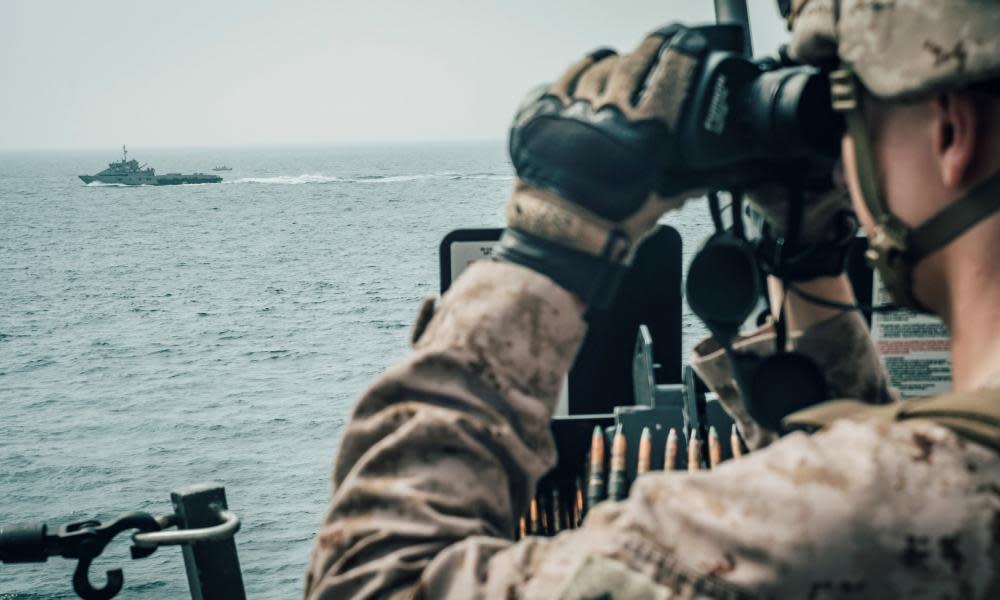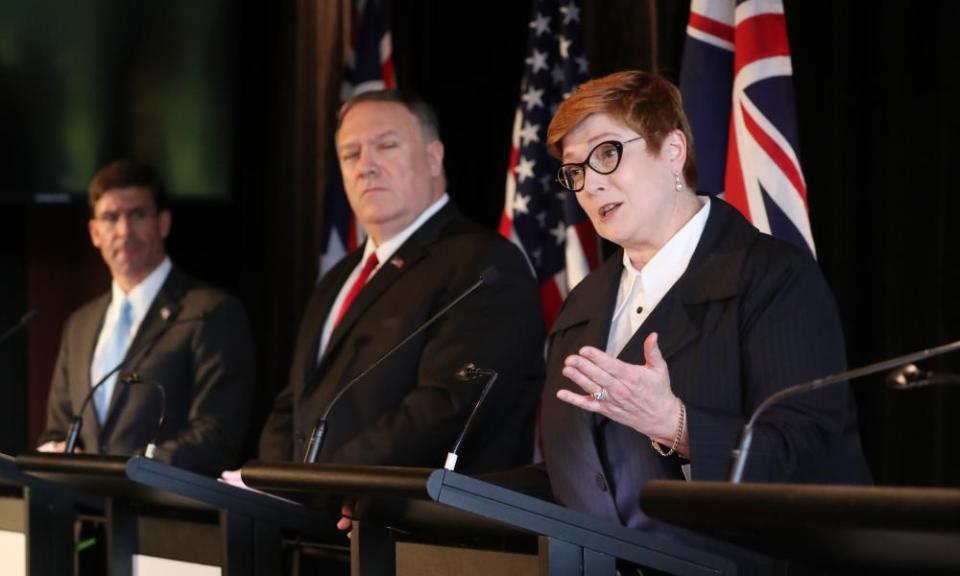Troubled waters: Australia bets on Trump in Middle East deployment

Australia’s announcement this week that it will join US-led freedom of navigation operations patrolling the Strait of Hormuz brings the number of American allies willing to contribute to America’s latest Middle East sortie to just three.
The increasing tensions in the narrow, but critical, strait are almost universally regarded as an avoidable, US-created crisis, the result of Washington tearing up the Iran nuclear deal.
“It starts and finishes with the US walking away from the JCPOA[the Joint Comprehensive Plan of Action on Iran]. We wouldn’t be in this situation if the US hadn’t acted in the way it has,” Rodger Shanahan, a research fellow with the Lowy Institute, told the Guardian.
Related: Australia to join US military effort to protect shipping in the Strait of Hormuz
“There is a lack of faith in US foreign policy decision-making under President Trump,” Shanahan said. “The prospect of putting assets under a US command that has great capability but little coherent strategic direction does not excite many countries.”
Few countries are willing to sign up to an incoherent US foreign policy – one that at once proclaims to be defending the international rules-based order while unilaterally tearing up an agreement (while imperfect) it had brokered and signed up to: essentially throwing the rule book away in favour of its realist “maximum pressure” on Iran through crippling sanctions.
Unsurprising but disappointing
Ashley Townshend, the director of foreign policy and defence at Sydney University’s United States Studies Centre, said Australia’s decision to join the US operation was “understandable, unsurprising, but very disappointing”, one principally made to satisfy a political request from the Trump administration. He argued that while Australia has clear interests in freedom of navigation and in securing energy supply lines through the Strait of Hormuz, Australia “should urge the [Trump] administration to return to a sensible path of diplomacy, which is how this ordeal can and should end”.
“America had a perfectly good deal with Iran to keep its nuclear ambitions in check – one that Australia and much of the international community supported. It was President Trump who tore it up. Canberra should condemn absolutely any coercion or use of force by Tehran in the Strait of Hormuz. But our focus should be on working with other like-minded countries to urge the White House back to the path of sensible diplomacy – one that will roll back the tensions created by Trump’s unilateral withdrawal from the Iran deal.”
The narrow Strait of Hormuz is globally significant. A third of the world’s liquefied natural gas and almost 20% of global oil production passes through it.
An increasingly unpredictable brinkmanship has emerged between the US and Iran since the US withdrew from the Iran deal in May 2018. Washington has pursued its “maximum pressure” strategy through economic and trade sanctions, while Tehran has responded by stepping up its nuclear program beyond the limits of the deal.
In July off the coast of Gibraltar, British marines working with Gibraltan police seized an Iranian supertanker suspected of carrying 2m barrels of oil to Syria in breach of sanctions. Spain said the interception had been conducted at the request of the US.
In an apparent reprisal, Iran then seized two oil tankers in the Strait of Hormuz, claiming the British and Liberian-flagged ships had breached maritime regulations.
Less coalition of the willing than collection of the wary
While the situation is deteriorating, there appears little enthusiasm for the US’s strategy.
A month after the US secretary of state, Mike Pompeo, declared the US would build a “global coalition”, just three countries, the UK, Bahrain and Australia, have agreed to contribute. Germany has refused an entreaty to join, while France has said it would not contribute to a US-led mission, but might consider a European-led one. (France and Germany are also less reliant on oil shipped through the strait than other economies, so there is a weaker economic imperative.)
But Australia is on board. The defence minister, Linda Reynolds, has insisted Australia’s contribution will be “modest, meaningful and time-limited”, aimed at “de-escalating tension in the gulf”.
Related: UK caught in middle of US power play with Iran
“This operation is designed to do itself out of business,” by ensuring freedom of navigation for shipping in the strait, she argued.
Australia’s contribution will be modest: a six-month deployment from a Major Fleet Unit (a naval warship, such as an Anzac class frigate) next year; a P8 Poseidon aircraft that will assist in patrols for a month, beginning later this year; and Australian Defence Force personnel who will work in the International Maritime Security Construct headquarters in Bahrain.
It appears likely the most significant contribution will simply be a re-tasking of a regular ongoing commitment. Australia deploys a ship for nine months out of every 12 in the Persian Gulf as part of Operation Manitou – a multinational anti-terrorism and anti-piracy operation protecting shipping in the Gulf. Australia has been running these operations since the 1990s.
Politics over policy
Operationally then, the commitment is minimal: but it is the politics that are pre-eminent in Australia’s calculation.
Australia has been invited to the G7 this weekend, and the prime minister, Scott Morrison, will be received in Washington with a state visit in September. The decision to commit to the Strait of Hormuz is, as Shanahan argues, “a smart move politically, because Washington is simply after the additional flag Australia provides, and we were after an ‘announceable’ to placate Washington”.

For a fractional commitment of personnel and materiel, Australia can firmly demonstrate its commitment to the US alliance, and it can do so far from the Indo-Pacific, where a more aggressive posture might aggrieve a sensitive Beijing.
But memories of the Iraq invasion loom long, and, while this operation is on a tiny scale by comparison, there is concern in some quarters that Australia has chosen to follow America into another military intervention in the Middle East without any real public or political debate.
The former secretary of the defence department Paul Barratt told the Guardian Australian involvement in potential military action in the Gulf could be illegal, and argued it was “very foolish for us to get involved in this provocative behaviour”.
“This is an application of military force. There ought to be a debate in the parliament, and we ought not to engage in any activity that would foreseeably involve the use of military force without that debate.”
Arguing, too, for a parliamentary debate, the Greens leader, Richard Di Natale, said it was a “grave mistake” for Australia to contribute to the US operation, a decision that “shows we’ve learned nothing from the tragedy, the catastrophe that was the invasion of Iraq”.

 Yahoo News
Yahoo News 
